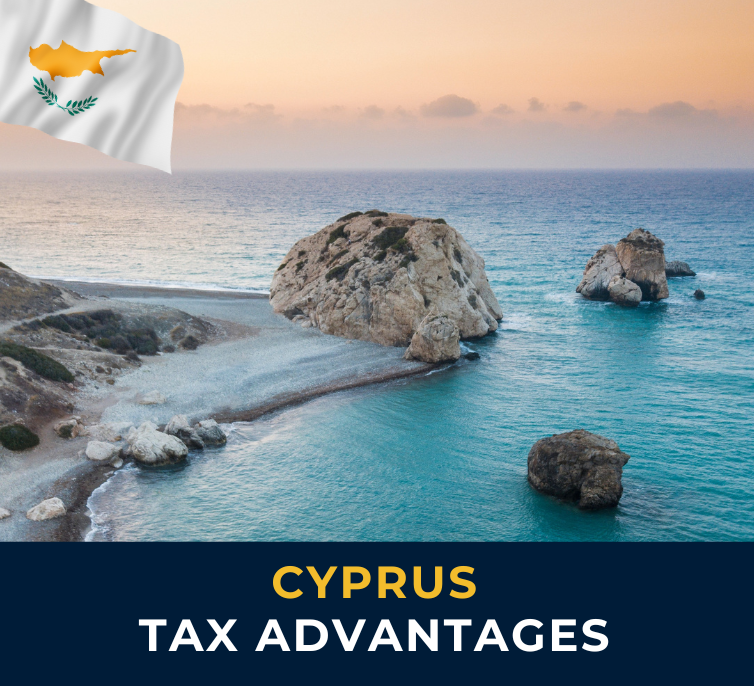Cyprus is an island located in the eastern Mediterranean, which is part of the European Union.
It is a relatively small country, with a population of around one million inhabitants, but it offers a series of tax advantages that have made it an attractive destination for Tax Nomads.
In recent years, Cyprus has received a growing number of people moving to the country to reduce their tax burden (and also to invest in the country, which is experiencing explosive growth).
In fact, it is our tax residency and the most chosen destination by our clients.
In this article, we will explore the reasons that make Cyprus a unique place in terms of taxation, as well as the special Non-Dom program that offers significant benefits.
Cyprus Tax Residency Benefits
Cyprus is undoubtedly at the top of tax residencies in the European Union.
Its most notable tax advantages are as follows:
- Gift Tax 0%
- Inheritance Tax 0%
- Wealth Tax 0%
- Capital Gains Tax 0% (except on real estate within Cyprus)
- Dividend income taxed at 2.65% on the first €180,000, then 0% (so the maximum you could pay on dividends, even if you receive a substantial amount, is €5,000)
- No exit tax on individuals
- No taxes on the sale of Stocks, Cryptocurrencies, and Securities
- Personal Income Tax 0% below €19,500
- Fixed rate of 5% on pension income
- No tax on lump sum payments received from pension schemes
- Cypriot Corporate Tax at 12.5%
What’s the best part?
The tax benefits of their Non-Dom Regime are guaranteed by Cyprus and the European Union for 17 years!
Moreover, with the few taxes you do pay, you will be covered by Public Health Care, Unemployment, Retirement, the European Health Insurance Card… all the classic social benefits of the EU!

Requirements to Become a Tax Resident in Cyprus
Cyprus has some of the most advantageous requirements among European and OECD countries in this area:
It only requires 60 days of your presence in the country.
However, with the 60-day rule, it is necessary to maintain at least one rental throughout the year in Cyprus (showing that you have accommodation at your disposal).
There is also the 183-day rule, with which it would not be necessary to maintain any accommodation permanently.
Non-Dom Regime
The fundamental requirement to access the Non-Dom Program (which is what allows so many tax advantages to new residents) is simple:
- You must not have been domiciled in Cyprus for 17 of the previous 20 years.
Therefore, unless you are a Cypriot by birth (unlikely), you can take advantage of the regime without any problems.
Immigration Requirements
Cyprus is part of the European Union, which means that all other citizens of EU countries can travel to Cyprus without a visa and register to reside in the country without needing extraordinary permits.
However, a passport will be necessary!
This is because Cyprus is not a member of the Schengen area, so to enter and leave, it is essential to present your passport.
Additionally, there is a list of non-EU countries that also enjoy visa-free travel to Cyprus, provided their stay is less than 90 days.
If you are not an EU citizen, you will need to obtain a residence permit with one of the various visas: study, work, investment, remote work…
However, for wealthy individuals from outside the EU, perhaps the most interesting option is obtaining residency by investment (starting at €300,000).

Living in Cyprus
What is Cyprus like? Where is Cyprus?
These are the big questions to answer, as the country is largely unknown to many.
We can tell you that the island is a true paradise, but as we know you will want to delve deeper, we are sharing an article where we discuss its living conditions:
Our review on Cyprus Tax Residency
Our opinion about Cyprus comes from experience, as it was personally our chosen destination.
As a tax residence, there are few alternatives where you can pay less taxes (such as the United Arab Emirates, for example), but when you combine the quality of life and social advantages of being in the European Union in Cyprus… it’s our top choice.
The average Tax Nomad in Cyprus pays around 15% of all their earnings, including taxes and social contributions.
With this, they enjoy a Mediterranean island with all amenities, a low cost of living compared to other options, and social coverage like any average EU country.
But now, it’s time for you to draw your own conclusions.
Are you interested in obtaining tax residency or setting up a company in Cyprus?
Or would you prefer a complete analysis of your situation to discover the best option for you?
In either case, we can help!
Simply request your FREE INITIAL CONSULTATION BY CLICKING HERE, or contact us directly via WhatsApp or through the form below.
Contact us
Opening a company in Cyprus costs between 2,495 and 3,500 euros.
The price range depends on the type of company being established and any additional services required for incorporation.
- Stay for 60 days per year + permanent residence in the country (rented or purchased)
- Stay in the country for more than 183 days per calendar year.
- Having Cyprus as the center of economic and vital interests.
Cryptocurrencies pay 0% tax in Cyprus as long as they are long-term investments and not trading.
Trading may be considered economic activity and taxed at 12.5% under Corporate Tax.
Living in Cyprus is a unique experience that combines the natural beauty of the Mediterranean with a relaxed and cosmopolitan lifestyle.
The island offers a warm and sunny climate year-round, paradise beaches, rugged mountains, and a rich history and culture. Cyprus is also a significant financial and commercial center, making it an attractive destination for expatriates.
The “non-dom” regime in Cyprus refers to a special scheme for tax residents that allows individuals not domiciled in Cyprus to enjoy certain significant tax advantages.
The 60-day rule in Cyprus refers to a residency requirement where individuals must spend at least 60 days in Cyprus during a tax year to be considered tax residents of the country.
Cyprus is not considered a tax haven currently.
Cyprus has worked on financial regulation and has signed information exchange agreements with other jurisdictions to prevent tax evasion and enhance international cooperation in tax matters.

